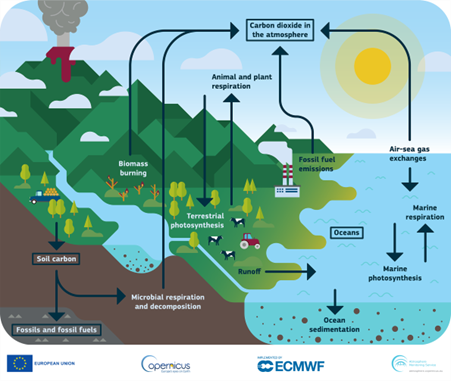The governing body of the World Meteorological Organization, the World Meteorological Congress, has unanimously approved the new “Global Greenhouse Gas Watch” that the Copernicus Monitoring Service (CAMS) will support and contribute to. All the 193 members unanimously recognised “the growing societal importance of greenhouse gas monitoring in support of improving our scientific understanding of the Earth System, and the urgent need to strengthen the science underpinning mitigation actions taken by the Parties to the United Nations Framework Convention on Climate Change (UNFCCC) and the Paris Agreement.”
This decisive endorsement follows the proposal by the WMO secretariat, based on the recommendations of the Greenhouse Gas Monitoring Symposium held in Geneva from 30 January – 1 February 2023 and supported by a concept note prepared by a dedicated study group.
Partners of the CORSO consortium were active contributors to these discussions and in the preparation of the concept note.
“It is a groundbreaking development that will change the way countries will be able to report and assess their greenhouse gas emissions thanks to routine and operational information on atmospheric concentrations and on net surface fluxes; the name of this initiative, Global Greenhouse Gas Watch recalls other successful international collaboration initiatives of WMO, particularly the World Weather Watch that was established in 1963 and still underpins modern numerical weather prediction.”
Collaboration with other entities with global operational monitoring capacity will be key to fill the current knowledge gaps in greenhouse gas monitoring. ECMWF, the Entrusted Entity for CAMS and coordinator of CORSO, will host a workshop in Bonn next September that will bring these teams together and will aim at developing an Implementation Plan for the “core modelling” aspects of the initiative.“
The routine monitoring of greenhouse gas fluxes, both anthropogenic and natural, is particularly challenging, as many processes are involved, and the numerous sources and sinks are not always well understood. The WMO in a press release says, “At present, there is no comprehensive, timely international exchange of surface and space-based greenhouse gas observations or modelling products.”
“The increase in carbon dioxide levels from 2020 to 2021 was higher than the average growth rate over the past decade and methane saw the biggest year-on-year jump since measurements started,” said WMO Secretary General Prof Petteri Taalas during the Congress meeting. “But there are still uncertainties, especially regarding the role in the carbon cycle of the ocean, the land biosphere and the permafrost areas,” added Prof. Taalas. “We therefore need to undertake greenhouse gas monitoring within an integrated Earth System framework in order to be able to account for natural sources and sinks, both as they currently operate and as they will change as a result of a changing climate. This will provide vital information and support for implementation of the Paris Agreement,” he said.
For Lars Peter Riishojgaard, Deputy Director of WMO Infrastructure Department, this decision is “a historic step.”
“Internationally coordinated global greenhouse gas monitoring open to all and operating under WMO’s policy of free and unrestricted exchange of data will provide valuable, timely and authoritative information on greenhouse gas fluxes to the UNFCCC Parties, which will help them in their efforts to mitigate climate change”, said Dr. Riishojggard.
CAMS already provides, operationally, several products monitoring carbon dioxide (CO2) and methane (CH4) concentrations as well as their net fluxes between the Earth’s surface and the atmosphere, based on emission inventories, in-situ and satellite observations, and models simulating emissions, absorption and circulation. However, the CoCO2 project and its sister project CORSO, in collaboration with several other research projects, are developing the prototype systems for a much more comprehensive Copernicus greenhouse monitoring system, which will contribute to the WMO global initiative. Dr Richard Engelen, Deputy Director of CAMS and project coordinator of CoCO2 and CORSO, said: “It is very exiting that all the innovative work in CoCO2 and CORSO will not only have a strong impact within Europe but also internationally under the collaborative framework of the WMO.”
Find out more about CAMS greenhouse gas monitoring activities.

